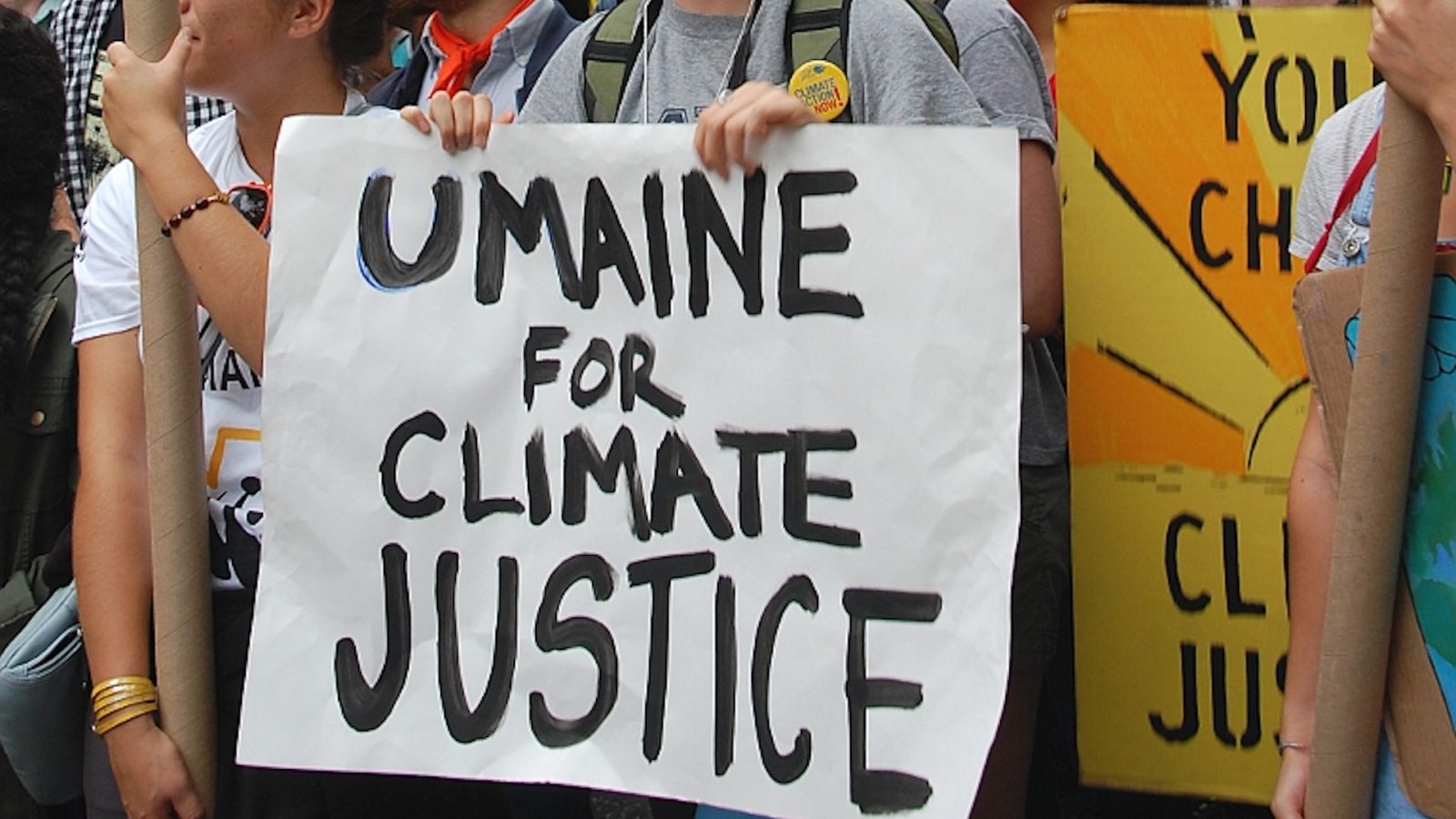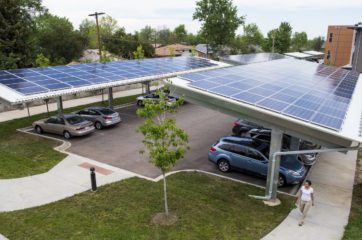In the face of historically exclusive spaces and performative actions, Maine youth are using their voices to flip the script through an unwavering focus on climate justice. The politics and demographics of Maine are indicative of a challenge faced by youth advocates and Black, Indigenous, and people of color: older white men tend to hold leadership roles in policy making and environmental organizations.
Who Lives in Maine?
Maine has the highest percentage of white residents of any state in America, with 94.4% of people identifying as white, and the highest percentage of elderly people, with over 20% of its population over the age of 65. Despite a population demographically likely to lean politically right, the state’s voting record is not particularly conservative. Maine has a Democrat-controlled House of Representatives and Senate, and elected Democrat Janet Mills as governor in 2019. The rural landscape leads to clusters of liberalism in more populated areas while some conservative-leaning residents are supportive of environmental protections.
As the most rural state in America, the people of Maine have a nuanced relationship with their environment. The geographic makeup of the state may present challenges in communication, and legislation, but does not deter people from fighting to protect the air, water, and living beings. Whether out of proximity or necessity, residents become connected to the land through the beauty and closeness of nature.
Mainers live off the land in many ways, from residing on family-owned farms to working in the fishing and logging industries. Whether it be a spirit of invested environmentalism or reliance on outdoor industries, the people of Maine defy norms in their voting habits and day-to-day interactions with the environment. However, climate change is often still seen as a partisan issue, and it’s often younger residents who have the biggest impact as environmental advocates.
Youth-Led Momentum for Inclusive Environmentalism
The political and social landscape of Maine provides a unique opportunity for interpersonal activism. Youth activists use unique ways to engage their classmates, families, and fellow community members with issues surrounding the climate crisis in their state and beyond. Person-to-person conversations provide for a deeper understanding of the pervasiveness of climate impacts on communities. However, the reach of youth voices does not stop within immediate circles, but continues through individuals and organizations, such as the Maine Environmental Changemakers Network, JustME for JustUS, and Maine Youth for Climate Justice (MYCJ).
MYCJ is a youth coalition that works to demand climate justice through organizing demonstrations, providing responses and support to equitable policies, and holding adult organizations accountable. The presence of youth voices brings a justice lens to decision making processes in the state, whether related to environmental policy or not.
MYCJ’s Youth Engagement Coordinator, Cassie Cain, has witnessed firsthand the ability of young people to change the tides of climate conversations, recognizing the ways in which the youth use their power to call out injustices. During coalition and committee meetings, Cain sees how Maine youth activists consistently push groups to put aside their infatuation with economic solutions and performative displays of support, and actively recenter the needs of BIPOC residents and low-income families in all decisions.
While the Maine legislature is considering many environmental bills this session, the landscapes in the state call for transformative change beyond policies. Maine is privy to structural barriers to inclusive policy as conversations about climate in political spaces have occurred without the most affected parties in the room. The actions taken by youth in the state consistently counter this practice by bringing a justice-based approach to the table, creating opportunities to educate people on the inseparable connection between systemic racism and the climate crisis.
Youth activist Amara Ifeji works at grassroots levels and beyond to ensure that conversations are not focused on climate change, but rather the more encompassing issue of climate justice. Her work is rooted in empowerment as she supports environmental education and youth involvement through holding a role in the Maine Environmental Education Organization and serving on the Maine Climate Council Equity Subcommittee. Ifeji and her fellow youth leaders work strategically to communicate the climate crisis in ways that relate to Mainers while holding actors accountable in their consideration of policy equity.
As put by youth activist Sirohi Kumar, adults are longtime participants in the systems that created the climate crisis while youth are new to this system and don’t feel as tied to it. Kumar calls on adults to look beyond what is necessary in the fight for environmental justice to imagine what is possible. The intersectionality of this fight is consistently brought to light by youth activists in Maine through organized demonstrations like the 2019 climate strike in Portland. Youth organizers of the strike, including Sirohi Kumar and Anna Siegel, demanded a state of climate emergency at both local and state levels. Siegel does state-specific work with organizations in Maine, including Sierra Club Maine and Maine Strikes, and is a known organizer and fierce advocate for intersectional justice in Maine.
Youth in the state collaborate in a unique way through a deep sense of community among activists and an ability to effectively organize and educate within their communities and across the state. Their work is increasingly influential as they gain traction in local environmental organizations, the Maine legislature, and beyond. The work of young people in Maine is exceptional as they build an empathetic and responsive community through their continued fight for representation, accountability, and justice in all its forms.
How Advocacy and Policy Interact
Upon her election in 2019, Governor Mills signed several climate-related bills into law, including an Act to Reform Maine’s Renewable Portfolio Standard, an Act To Promote Solar Energy Projects, and, most notably, the Act to Promote Clean Energy Jobs and To Establish the Maine Climate Council. This bill created the Maine Climate Council, a body to lead Maine’s initiatives to neutralize carbon emissions and aid in the economic transition to clean energy. In December of 2020, the Climate Council released Maine’s Four-Year Plan for Climate Action. The plan extensively outlines the ways in which the state plans to reduce greenhouse gas emissions, foster economic growth, invest in infrastructure, and analyze results of mitigating actions.
The Climate Council is still working to procure the funding and legislation necessary to meet all the outlined goals. While the plan is a huge step in many ways, especially as compared to previous Governor Paul LePage’s anti-renewables stances, some concerned individuals and advocacy groups are not fully sold on how effective it will be. The presence of the Equity Subcommittee in the implementation process is vital, however, the needs of the people in Maine may be best met by a plan that centers around a just transition. Recommendations to center equity have been vocalized in a petition by representatives from Maine Youth for Climate Justice, JustMe for JustUs, the Maine Environmental Changemakers Network, and Maine Climate Action NOW.
As for current policy endeavors, the Maine Legislature convened on December 2, 2020, and adjourns on June 16, 2021. Many proposed policies regarding equity, the environment, and the climate are being closely watched by Maine youth, reflecting their intersectional priorities in regards to climate justice. The following policies have gained fairly broad support through testimonies of youth activists and environmental groups alike:
- The consumer owned utility bill and fossil fuel divestment bill have the potential to transform energy usage in the state.
- The Act To Require the Inclusion of Racial Impact Statements in the Legislative Process and Act Requiring Climate Impact Notes on Proposed Legislation are focused on bringing about intersectional changes at every stage of the legislative process.
- The Pine Tree Amendment, proposed by Senator Chloe Maxmin, which would change Maine’s constitution to provide the right to a healthy environment. This amendment could be a huge win in its ability to provide legal protections for both Mainers and their environment.
- Tribal sovereignty bills, including an Act To Create Gaming Equity and Fairness for the Native American Tribes in Maine and an Act to Establish a Permanent Appointment of a Member of the Wabanaki Tribes to the Marine Resources Advisory Council are also being reintroduced this session and have gained widespread support from environmental groups and Maine Youth. This bill would reinstate the rights of tribes in Maine that were taken from them through the 1980 Settlement Act.
Climate Justice as an Urgent Need and a Slow Burn
The impacts of warming are often seen slowly over time. As sea level rises little by little and temperature averages climb annually, it can be easy to deem the climate crisis a faraway issue. In Maine, however, the disruption of weather systems and decline of predominant industries are signs that impacts of warming are already occurring. Moreover, the immediacy is evident in the impacts of the changing climate on BIPOC residents of Maine. While environmental indicators help create a sense of immediacy, the harm to historically vulnerable communities necessitates urgent but intentional responsiveness and deep systemic change. Rushed policy decisions can exacerbate existing disparities, especially when underserved and overburdened communities are not meaningfully included in the process.
Climate justice is multifaceted and the need to dismantle existing oppressive systems cannot be met by a single policy or shift in leadership. Youth and BIPOC activists continually work to look beyond existing structures to bring equity to the forefront of every decision. The urgent need to address the climate crisis and the paramount importance of investing in equity are not mutually exclusive — it takes time to approach issues comprehensively, but the work is intensive, meaningful, and compelling. Being in it for the long haul doesn’t mean that youth activists in Maine are lying in wait, as clearly evidenced by the plethora of actions already taken at local and state levels to garner support and responses in favor of a just transition.
Supporting youth’s transformative role in climate justice means going beyond having their presence in the room; it means welcoming them in droves to conversations and decision making, compensating them for their work, valuing their knowledge, and supporting (or joining) their actions. The demands of youth are not radical; they are integral to an equitable and livable future.









